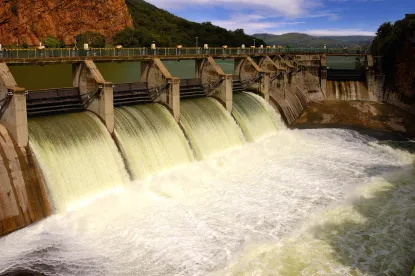EPA Signals Intent to Walk Back Clean Water Act 401 Rule
Citing numerous “concerns” with the Clean Water Act (CWA) section 401 water quality certification rule enacted by the Trump Administration in 2020, the Environmental Protection Agency (EPA) has issued a Notice of Intention to reconsider and revise the rule. EPA’s notice states that the new rule will be “better aligned with the cooperative federalism principles that have been central to the effective implementation of the Clean Water Act” and is “responsive to the national objectives outlined in President Biden’s Executive Order 13990.”
The EPA’s notice solicits feedback related to 10 “key issues”: (1) the requirement for an applicant to request a meeting with the certifying agency at least 30 days prior to submitting a certification request; (2) the definition and elements of a certification request that triggers the statutory review period; (3) how a determination is made as to what is a reasonable period of time for a certifying agency to act on a request; (4) the scope of certification authority, including whether EPA should revise its interpretation of scope to include potential impacts to water quality not only from the “discharge” but also from the “activity as a whole;” (5) federal agency review of certification actions; (6) enforcement authority of certifying agencies and whether the citizens suit provisions of the CWA apply to section 401; (7) the ability of certifying agencies to modify or reopen a certification; (8) the “neighboring jurisdiction” process under CWA section 401(a)(2); (9) data and other information on implementation of the current rule; and (10) implementation of rule revisions.
Comments are due August 2, 2021. The current rule, which has been challenged in several different U.S. district courts around the country, will remain in effect until the new rule is finalized. Meanwhile, on May 20, 2021, Senator John Barrasso (R-WY) introduced the Water Quality Certification Improvement Act of 2021, S. 1761, which would preserve key aspects of the current rule.
Clean Water Act 401 Waiver Cases Update
On the litigation front, a plethora of cases are working their way through the U.S. courts of appeals challenging Federal Energy Regulatory Commission (FERC) decisions regarding state waiver of CWA section 401 certification authority. The cases arise out of FERC’s implementation of Hoopa Valley Tribe v. FERC (Hoopa), in which the U.S. Court of Appeals for the D.C. Circuit held that a hydroelectric licensee’s repeated withdrawal and resubmission of water quality certification requests under section 401 pursuant to a written agreement with state water quality agencies does not trigger a new one-year period for state water quality review and results in waiver of the state’s authority. FERC has applied the Hoopa ruling in a number of hydroelectric licensing and natural gas pipeline certification cases, in some instances finding waiver and in other instances finding that the state agency did not waive its authority. Here is a current rundown of the cases in the courts of appeals:
-
In New York State Dep’t of Environmental Conservation v. FERC, on March 23, 2021, the U.S. Court of Appeals for the Second Circuit issued an opinion affirming FERC’s interpretation of section 401 that the state agency waived its authority by agreeing with the pipeline applicant retroactively to alter the date on which the state was deemed to have received the certification request. Petitions for a writ of certiorari are due no later than June 21, 2021.
-
In North Carolina Dep’t of Environmental Quality v. FERC, the State of North Carolina is challenging FERC’s sua sponte finding of waiver of water quality certification where the applicant withdrew and refiled its certification request to avoid the one-year deadline in coordination with the state water quality agency. The U.S. Court of Appeals for the Fourth Circuit panel held oral argument on this case on May 6. The decision is pending.
-
Six proceedings before the U.S. Court of Appeals for the Ninth Circuit were consolidated on May 20, 2021. The California State Water Resources Control Board (California Board) and environmental groups are challenging FERC orders finding waiver of 401 certification for the Yuba-Bear, Yuba River Development, Merced River, and Merced Falls hydroelectric projects based on a coordinated process of withdrawal and refiling of certification requests to avoid the one-year deadline. Petitioners’ opening briefs are due in July. Van Ness Feldman represents licensees Yuba County Water Agency and Nevada Irrigation District in the consolidated cases.
-
In KEI (Maine) Power Management III LLC v. FERC, on May 6, the D.C. Circuit issued an order keeping the case in abeyance as the parties continue settlement negotiations over fish passage conditions for a hydroelectric project. FERC issued a license for the Barkers Mill Project in April 2020 while the 401 certification was still on appeal before the state agency, finding in this case that the state did not waive certification because the applicant withdrew and refiled its certification request for its own reasons and not at the direction of the state.
-
In Village of Morrisville v. FERC, on May 12, 2021, the D.C. Circuit issued an order holding the case in abeyance pending the outcome of the other cases discussed above. In this case FERC also denied the applicant’s request for a waiver determination, finding that the applicant voluntarily withdrew and refiled its application for its own purposes and not to give the state more time for its decision.
-
On May 21, 2021, the Turlock and Modesto Irrigation Districts filed petitions for review before the D.C. Circuit. The licensees for the Don Pedro Project and applicants for the unlicensed La Grange Project are challenging FERC’s declaratory order finding that the California Board did not waive 401 authority by denying certification “without prejudice” within the one-year period.
FWS Issues Proposed Rule on Regulations Governing Take of Migratory Birds
On May 7, 2021, the U.S. Fish and Wildlife Service (FWS) published a proposed rule to revoke the Trump-era FWS rule limiting the effect of the Migratory Bird Treaty Act (MBTA). The previous rule, published on January 7, 2021, stated that the scope of the MBTA applies only to intentional injuring or killing of birds and that conduct that results in the unintentional (incidental) injury or death of migratory birds is not prohibited under the MBTA. This January 7 rule had been based on a Department of the Interior Solicitor’s Office Opinion, which has since been overturned by the District Court for the Southern District of New York.
The FWS states that the new proposed rule will properly interpret the MBTA by clarifying that under the Act one can face criminal penalties for incidental migratory bird deaths. The proposed rule further provides that enforcement discretion would be applied, subject to certain legal constraints. Comments on the proposed rule are due June 7, 2021.
Biden-Harris Administration Launches Campaign to Restore and Conserve 30 Percent of America’s Lands and Waters by 2030
The Biden-Harris Administration announced a national decade-long America the Beautiful campaign to conserve, connect, and restore our land, water, and wildlife. This announcement builds off of directives in President Biden’s Executive Order 14008, Tackling the Climate Crisis at Home and Abroad (Jan. 27, 2021).
The details of the campaign are outlined in a report that calls for locally led and voluntary conservation and restoration efforts across the public, private, and Tribal lands and waters to create jobs and strengthen the economy. The report further focuses on the climate crisis and inequitable access to the outdoors. This report identifies six priority areas for early focus and investment: (1) creating more parks and safe outdoor opportunities; (2) supporting Tribally led conservation and restoration priorities; (3) expanding collaborative conservation of fish and wildlife habitats; (4) increasing access for outdoor recreation; (5) incentivizing and rewarding voluntary conservation efforts of fisheries, ranchers, farmers, and forest owners; and (6) creating jobs by investing in restoration and resilience projects and initiatives. Government agencies have already begun efforts to meet the campaign goals, including the National Park Service’s announcement to provide $150 million in funding for the Outdoor Recreation Legacy Partnership Program, which helps build parks in underserved communities.
Battle of the Listed Species: Oregon District Court Denies Klamath Tribes’ Challenge to Salmon Flows
On May 6, 2021, the U.S. District Court for the District of Oregon denied a request for emergency relief by the Klamath Tribes to limit the Bureau of Reclamation’s (Reclamation) releases of water from the Upper Klamath Lake under Reclamation’s interim operation plan for the Klamath Irrigation Project. Reclamation makes such releases to protect salmon; however, the Tribes assert that the releases would further endanger the C’waam, or Lost River sucker, and the Koptu, or shortnose sucker.
In April 2021, the Klamath Tribes brought suit against Reclamation, asserting that Reclamation’s implementation of its interim operation plan was in violation the Endangered Species Act (ESA) because implementation of the plan would result in incidental take of the suckers by reducing the amount of water in the Upper Klamath Lake, and Reclamation had failed to adequately consult with the FWS.
The interim operation plan was put in place while Reclamation consults with FWS and the National Marine Fisheries Service under the ESA regarding long-term operations of the Klamath Irrigation Project. FWS issued a biological opinion in 2020 on the interim operation plan and concluded that the plan was not likely to jeopardize the continued existence of the suckers based on certain assumptions regarding the lake elevation. Due to extreme drought conditions, the lake elevation is not being maintained as proposed.
In denying the Tribes’ request for emergency relief, the district court concluded that the Tribes had failed to demonstrate a likelihood of success on the merits of their ESA claims. The court noted that Reclamation is managing resources under hydrologic conditions that are beyond its control, and that it has done so in consultation with expert agencies and relevant stakeholders. The court found that the incidental take statement in the 2020 biological opinion acknowledged that it was a possibility that the lake elevation would not be maintained, and that as soon as it became clear that Upper Klamath Lake elevation would not be maintained within the scope of the biological opinion, Reclamation complied with its obligation under the biological opinion to consult with FWS “to adaptively manage and take corrective actions.”
Conservation Groups Intend to Sue Dams Allegedly Threating Survival of Atlantic Salmon
On May 12, 2021, the Conservation Law Foundation, Maine Rivers, and the Natural Resources Council of Maine (the “Conservation Groups”) sent Brookfield Renewable Partners L.P. a notice of intent to sue for violations of the ESA stemming from the ongoing operations of four hydropower projects on the Kennebec River in Maine. The Conservation Groups allege that each project is operating without authorization for the “take” of a listed species, the Gulf of Maine Distinct Population Segment of Atlantic salmon, as take authorizations for the projects expired on December 31, 2019. The Conservation Groups allege that the projects do not allow for upstream or downstream migration of the salmon, resulting in a take, which the ESA defines to include harassing, harming, pursuing, wounding or killing a listed species, as well as adverse modifications to the salmon habitat. The Conservation Groups also reference recommendations from state and federal agencies that the projects be decommissioned and removed.
The Conservation Groups argue that unless Brookfield suspends operations of the projects or obtains incidental take permits that mitigate impacts to the salmon, Brookfield remains in violation of the ESA. Among other things, the case raises the question of whether the mere existence of a dam in a stream constitutes “take” under the ESA.
FERC Closes the Books on Boyce Licenses
On May 20, 2021, FERC ended the long saga of Boyce Hydro Power, LLC’s (Boyce) ill-fated licenses for its Edenville, Sanford, Secord, and Smallwood hydroelectric projects. FERC revoked the Edenville license in 2018. In May 2019, the Edenville dam and downstream Sanford dam both failed during a record flood event. FERC agreed with Boyce’s February 2021 request to terminate the remaining three licenses based on FERC’s doctrine of implied surrender, given that Boyce had months earlier lost control of the project properties as a result of eminent domain actions by Midland and Gladwin Counties, Michigan, which hope to rebuild the two breached dams. The Counties’ agent, Four Lakes Task Force, had made clear that it had no intention of operating the dams as hydroelectric projects under FERC jurisdiction. Boyce argued, and FERC concurred, that given the unique circumstances of the eminent domain actions and Boyce’s bankruptcy and impending dissolution, it made no sense for FERC to issue license surrender orders, to which FERC typically attaches numerous conditions that must be satisfied before a surrender can become effective. FERC’s order also reiterated, as urged by Boyce, that the $15 million civil penalty FERC assessed against Boyce for various license violations would be subordinated to the bankruptcy’s settlement fund for flooding victims of the Edenville and Sanford dam breaches. Meanwhile, in Krieger v. Michigan Department of Environment, Case Nos. 20-000094-MM et al., a state court rejected the Michigan dam safety agency’s motion to dismiss an inverse condemnation suit by property owners claiming the state failed to properly regulate the Edenville dam before it breached. Van Ness Feldman assisted Boyce in the surrender proceedings before FERC.








 />i
/>i

